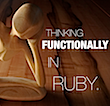 Thinking Functionally in Ruby is a talk that British Ruby developer Tom Stuart gave at a recent London Ruby Users Group meeting. In it he covers what functional programming is, why it’s a “pretty neat idea,” and how to adopt functional programming principles in Ruby. Skills Matter took a video of the entire 47 minute presentation (it’s embedded on the right hand side of that page – Flash required.. just been told it might be limited to UK visitors only, if so get the original MP4 file) but there’s also a 110 page PDF (1.5MB download) you should have to hand too (with Tom’s slides). Read More
Thinking Functionally in Ruby is a talk that British Ruby developer Tom Stuart gave at a recent London Ruby Users Group meeting. In it he covers what functional programming is, why it’s a “pretty neat idea,” and how to adopt functional programming principles in Ruby. Skills Matter took a video of the entire 47 minute presentation (it’s embedded on the right hand side of that page – Flash required.. just been told it might be limited to UK visitors only, if so get the original MP4 file) but there’s also a 110 page PDF (1.5MB download) you should have to hand too (with Tom’s slides). Read More
 Heroku is a Ruby webapp hosting service that we first mentioned about two years ago. It started off as an online IDE of sorts, but is now a complete cloud platform for running Ruby webapps. You can develop locally and then, with a single command, deploy your app to their metered service. Well, Heroku got in touch with me last week to talk about their new “Add-Ons” feature and they’ve really kicked things up a notch for people wanting to quickly roll out webapps online.
Heroku is a Ruby webapp hosting service that we first mentioned about two years ago. It started off as an online IDE of sorts, but is now a complete cloud platform for running Ruby webapps. You can develop locally and then, with a single command, deploy your app to their metered service. Well, Heroku got in touch with me last week to talk about their new “Add-Ons” feature and they’ve really kicked things up a notch for people wanting to quickly roll out webapps online.
Till now, Heroku has provided basic functionality on a semi-metered basis. You pay a monthly fee for a basic rate of service and then pay an hourly rate for more concurrency. Read More
 Just two months ago we posted about Gemcutter, a new RubyGem hosting repository that, we said, was “taking aim at RubyForge and GitHub.” It only took six weeks for GitHub to give up on building gems and to start recommending Gemcutter instead. Today, RubyForge is toppled also. Gemcutter developer Nick Quaranto has announced that Ruby Central has given the thumbs up to replacing http://gems.rubyforge.org/ with http://rubygems.org/ (the new Gemcutter URL) as the default gem host in RubyGems.
Just two months ago we posted about Gemcutter, a new RubyGem hosting repository that, we said, was “taking aim at RubyForge and GitHub.” It only took six weeks for GitHub to give up on building gems and to start recommending Gemcutter instead. Today, RubyForge is toppled also. Gemcutter developer Nick Quaranto has announced that Ruby Central has given the thumbs up to replacing http://gems.rubyforge.org/ with http://rubygems.org/ (the new Gemcutter URL) as the default gem host in RubyGems.
The transition from RubyForge to Gemcutter/RubyGems.org isn’t an overnight deal and gem publishing from RubyForge will continue to work for the time being, but within the next couple of months, RubyForge accounts will be merged with Gemcutter and an update will be made to change the canonical gem source (though, of course, you can use Gemcutter already if you like by following their instructions). Read More
 Boson is a new command/task framework for Ruby by Gabriel Horner (of Hirb fame). Gabriel seems to be trying to supersede Rake, the Ruby “make” equivalent, and from first glance Boson seems to provide many benefits from the “reinvent the wheel” philosophy.
Boson is a new command/task framework for Ruby by Gabriel Horner (of Hirb fame). Gabriel seems to be trying to supersede Rake, the Ruby “make” equivalent, and from first glance Boson seems to provide many benefits from the “reinvent the wheel” philosophy.
Anyone who’s built a Rakefile knows it’s not the most straightforward syntax, so Boson’s approach of using regular Ruby code in the shape of methods added to a module is refreshing. Tasks are methods, methods are tasks—simple. Within these methods, you can use the options helper method and passed arguments to access command line options and other data. Read More
 If you’ve worked with Web apps using Ruby, you might know of Rack, an interface that sits between Ruby applications and HTTP-speaking Web servers. All of the major Ruby frameworks and server setups use it now, including Rails. Middleware (in Rack) is code that manipulates data going back and forth between your Ruby apps and the HTTP server. You can use middleware to intercept requests, change data in mid-flow, etc. Ryan Bates has a great screencast tutorial if you’re new to the concept and want to build your own.
If you’ve worked with Web apps using Ruby, you might know of Rack, an interface that sits between Ruby applications and HTTP-speaking Web servers. All of the major Ruby frameworks and server setups use it now, including Rails. Middleware (in Rack) is code that manipulates data going back and forth between your Ruby apps and the HTTP server. You can use middleware to intercept requests, change data in mid-flow, etc. Ryan Bates has a great screencast tutorial if you’re new to the concept and want to build your own.
P.S. I know the term “middlewares” sounds borderline insane, but.. it works, you know what it means – yada, yada ;-)
In this post, we’re going to highlight various Rack middlewares from CodeRack, an on-going Rack middleware competition:
Karma Chameleon – Focused at Rails developers, Karma Chameleon makes it easy to automatically have file extensions added to all of your app’s links and URLs. Read More
 Egyptian Ruby developer Muhammed Ali (of MySQLPlus fame) has released the first draft of a “Ruby 1.9.x Web Servers” booklet. It looks at how different HTTP daemons and server libraries (Thin, Passenger, WEBrick and Mongrel) perform in Ruby 1.9.1. You can read the book for free on his site or on Scribd, but if you want to download a PDF to view locally you’ll need to have a free Scribd account, alas.
Egyptian Ruby developer Muhammed Ali (of MySQLPlus fame) has released the first draft of a “Ruby 1.9.x Web Servers” booklet. It looks at how different HTTP daemons and server libraries (Thin, Passenger, WEBrick and Mongrel) perform in Ruby 1.9.1. You can read the book for free on his site or on Scribd, but if you want to download a PDF to view locally you’ll need to have a free Scribd account, alas.
As of this first draft, the e-book’s 60 pages long – resulting in about 50 pages of actual content. It’s clearly a draft, but Mohammed has put together a pretty readable overview of the state of not only Web servers but basic TCP servers and concurrency issues on Ruby 1.9. Read More
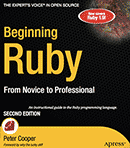 A few days ago I received the latest in a long line of royalty statements for my book, Beginning Ruby (as published by Apress). Long time readers might recall that Ruby Inside was started principally to promote the book, but turned into so much more that the book took a back seat. Well, the whim came over me to share the murky details of being the author of such a book, including how the royalty statements work (or not), how much is earned, sales figures, and so forth.
A few days ago I received the latest in a long line of royalty statements for my book, Beginning Ruby (as published by Apress). Long time readers might recall that Ruby Inside was started principally to promote the book, but turned into so much more that the book took a back seat. Well, the whim came over me to share the murky details of being the author of such a book, including how the royalty statements work (or not), how much is earned, sales figures, and so forth.
So I wrote What I’ve Earned (And Learned) From Writing “Beginning Ruby” over at the new, official Beginning Ruby promotional site. Read More
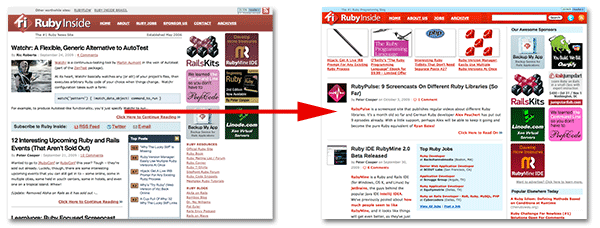 They’ve had several days to settle in, but because most of you will be reading via the RSS feed it’s time to make a point to announce that… Ruby Inside and Rails Inside have both been redesigned! If you usually just read the full-text RSS feed, do come and visit the site – if only to let us know what you think.
They’ve had several days to settle in, but because most of you will be reading via the RSS feed it’s time to make a point to announce that… Ruby Inside and Rails Inside have both been redesigned! If you usually just read the full-text RSS feed, do come and visit the site – if only to let us know what you think.
The new design marks the 3rd major redevelopment of Ruby Inside since 2006 and the stats from the last week are showing it to be a lot more effective with a 40% increase in pageviews per visitor. As well as an improved design, new features include:
- An extended “elsewhere” section with automatically updated links to other top Ruby content each day
- Our listing of the “Top 10 Ruby Sites” on every page’s sidebar (Wanna know what they are?
 RubyPulse is a screencast site that publishes regular videos about different Ruby libraries. It’s a month old so far and German Ruby developer Alex Peuchert has put out 9 episodes already. With a little support, perhaps Alex will be able to keep it going and become the pure Ruby equivalent of Ryan Bates!
RubyPulse is a screencast site that publishes regular videos about different Ruby libraries. It’s a month old so far and German Ruby developer Alex Peuchert has put out 9 episodes already. With a little support, perhaps Alex will be able to keep it going and become the pure Ruby equivalent of Ryan Bates!
Each RubyPulse episode is in Quicktime format and about 4 minutes long – each is also available in an iPod/iPhone tailored format. The nine episodes of RubyPulse so far include:
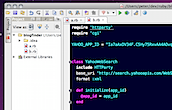 RubyMine is a Ruby and Rails IDE (for Windows, OS X, and Linux) by JetBrains, the guys behind the popular Java IDE IntelliJ IDEA. We’ve previously posted about how much people seem to like RubyMine, and it looks like things will get even better, as they’ve just released the beta of RubyMine 2.0. Notably, RubyMine 2.0 will be free to existing 1.0 users as it falls within the year allowed for free updates!
RubyMine is a Ruby and Rails IDE (for Windows, OS X, and Linux) by JetBrains, the guys behind the popular Java IDE IntelliJ IDEA. We’ve previously posted about how much people seem to like RubyMine, and it looks like things will get even better, as they’ve just released the beta of RubyMine 2.0. Notably, RubyMine 2.0 will be free to existing 1.0 users as it falls within the year allowed for free updates!
The New Stuff
RubyMine 2.0 was initially meant to only be RubyMine 1.5 but Eugene Toporov of JetBrains told me that they’ve considered 2.0 to be more appropriate given the number of updates and additions. Read More
 Today Phusion has announced the release of Ruby Enterprise Edition (REE) 1.8.7 (more specifically, 1.8.7-20090928). Once considered a bit of a joke, given the name, REE has proven itself to be anything but, with significant memory usage and speed improvements over the stock “MRI” Ruby implementation (achieved by way of patches to the MRI code). The key development with this release is compatibility with Ruby 1.8.7, rather than the 1.8.6 of previous versions.
Today Phusion has announced the release of Ruby Enterprise Edition (REE) 1.8.7 (more specifically, 1.8.7-20090928). Once considered a bit of a joke, given the name, REE has proven itself to be anything but, with significant memory usage and speed improvements over the stock “MRI” Ruby implementation (achieved by way of patches to the MRI code). The key development with this release is compatibility with Ruby 1.8.7, rather than the 1.8.6 of previous versions.
While REE has shown itself to be a good performer compared to the unpatched MRI implementation before, this week Evan Weaver of Twitter revealed how a release candidate version of REE 1.8.7 has resulted in a significant throughput increase on the same codebase. Read More
 A couple of weeks ago, popular micro-blogging service Twitter unveiled a beta “streaming API.” Twitter’s nature means they get hammered with polling requests so they’ve begun to experiment with the concept of streaming relevant data within a single HTTP request (in a Comet style). TweetStream (or GitHub repo) is a new Ruby library by Michael Bleigh to handle interacting with Twitter streams from Ruby.
A couple of weeks ago, popular micro-blogging service Twitter unveiled a beta “streaming API.” Twitter’s nature means they get hammered with polling requests so they’ve begun to experiment with the concept of streaming relevant data within a single HTTP request (in a Comet style). TweetStream (or GitHub repo) is a new Ruby library by Michael Bleigh to handle interacting with Twitter streams from Ruby.
TweetStream is available as a gem from both GitHub and Gemcutter (which, incidentally, got a fresh design today) and installation instructions are given in Michael’s blog post about TweetStream. Once you’re all installed, though, reading the live stream becomes as simple as:
require ‘tweetstream’
TweetStream::Client.new(TWITTER_USERNAME, TWITTER_PASSWORD).sample do |status|
puts “[#{status.user.screen_name}] #{status.text}”
end
Beyond basic functions, though, TweetStream also include daemonization features that allow you to create scripts that run in the background “out of the box.” You could add these features yourself with the daemons library, sure, but having this at hand to quickly throw together Twitter scripts is pretty cool. Read More
Wanted to go to JRubyConf or RubyConf this year? Tough – they’re sold out already. Luckily, though, there are some interesting upcoming events that you can still get in to – some online, some in multiple cities, some held in youth centers, some in hotels, and even one on a tropical island. Whew!
(Update: Removed Aloha on Rails as it has sold out – thanks to Tammer Saleh for the note.)
Free “Optimizing Your Online Store” Webinar (Online; September 24, 2009)
![]()
New Relic is running a free webinar event on Thursday, September 24 for developers and customers interested in optimizing e-commerce sites ready for the 2009 holiday season. Read More
Learnivore is a new(ish) site by  French Rubyist Thibaut Barrère that aims to aggregate all of the best screencasts in any easy to navigate, searchable manner. Learnivore is worth following (you can even follow it on Twitter) because unlike blog posts, screencasts from disparate sources haven’t really been specifically indexed and presented well before.
French Rubyist Thibaut Barrère that aims to aggregate all of the best screencasts in any easy to navigate, searchable manner. Learnivore is worth following (you can even follow it on Twitter) because unlike blog posts, screencasts from disparate sources haven’t really been specifically indexed and presented well before.
Currently, Learnivore has a very strong Ruby and Rails focus though it’s not exclusively Ruby – there are some Web design and iPhone videos mixed in there (though mostly still of interest to the average Rubyist, IMHO). The sources are BDDCasts, EnvyCasts, New Relic, SitePoint, Peepcode, Railscasts, RubyPulse, and the Pragmatic Programmers – all Ruby-leaning sources. Read More
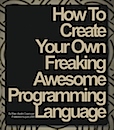 Create Your Own Programming Language is a interesting new information product and community by Marc-André Cournoyer (of Thin fame) that promises to teach you how to create a simple programming language. The official site is well worth checking out, even if you don’t want to buy it, as it’s a great example of how to sell a product like this. Create Your Own Programming Language costs $39.99 and has a two month money back guarantee.
Create Your Own Programming Language is a interesting new information product and community by Marc-André Cournoyer (of Thin fame) that promises to teach you how to create a simple programming language. The official site is well worth checking out, even if you don’t want to buy it, as it’s a great example of how to sell a product like this. Create Your Own Programming Language costs $39.99 and has a two month money back guarantee.
What You Get – 2 Different Approaches
The package includes a 53 page PDF (only 44 pages in the earlier copy I received), a pile of source code (for two different types of bootstrapped languages), and a screencast, along with access to a community of other users. Read More
